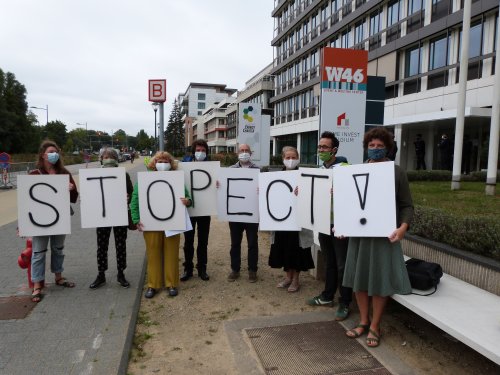Global Justice Now | 22 November 2023
Energy Charter Treaty plans for expansion revealed in recently posted notes
· Notes from the Energy Charter Treaty Conference held on Monday 20 Nov recently posted reveal plans for the controversial Energy Charter Treaty to expand to more oil-producing countries
· Lifting the current pause on accession to the treaty is set out as a priority for next year – irrespective of the outcome of modernisation processes which aimed to set out safeguards to prevent countries being sued for taking climate action
· Modernisation of the treaty was taken off the table on Monday’s Conference due to lack of EU support, mounting pressure on the UK to exit the treaty as its self-imposed November deadline has passed
The remaining members of the controversial Energy Charter Treaty plans to expand its membership, and have already organised meetings with ‘petroleum exporting countries’, according to posted notes from the Energy Charter Treaty Conference held at the start of this week.
The Energy Charter Treaty (ECT) is an investment agreement between 50 countries for the energy sector. It allows foreign companies to sue governments outside of the national legal system through the contentious investor-state dispute settlement (ISDS) mechanism – also known as ‘corporate courts’.
The amounts at stake can be in the billions, and the ECT has already generated at least 158 claims, making it the world’s most litigated ISDS agreement.
The notes posted from the outcome of the ECT Conference’s recent meeting read: “In line with CONEXO policy objectives, the Secretariat has reached out to the Organisation of Petroleum Exporting Countries “OPEC’, and, in view of exploring potential cooperation, a technical meeting between both organisations was organised in June 2023”.
CONEXO – which stands for ‘Consolidation-Expansion-Outreach’ – is the Energy Charter Treaty’s policy to get new country accessions. Currently, there are 56 signatories and contracting parties to the Energy Charter Treaty. However, earlier this year it was revealed that the European Commission is considering a coordinated EU withdrawal of member states, posing a blow to the continuance of the Energy Charter Treaty.
The expansion policy had been paused until the modernisation process was agreed, but reform proposals were removed from the Monday’s Conference agenda for the third time in a row. The Conference’s notes now outline a 2024 priority is “lifting of the pause on accession whatever are the modernisation of the Treaty conclusions.” This appears in the context of the treaty Secretariat bemoaning a “challenging year” following multiple member countries announcing their withdrawal and therefore reduced budget contributions.
The UK has given itself a November deadline to consider exiting the treaty if modernisation was not agreed. The deadline has now passed, adding to pressure for the UK to exit the treaty as COP28 nears, with the All Party Parliamentary Group (APPG) on the Environment last week adding its voice to the calls in a published briefing.
Earlier this month, leaked documents revealed Jersey-based oil-refining company is suing the EU, Germany and Denmark under the ECT for at least €95m over the imposition of a windfall tax.
Cleodie Rickard, trade campaign manager at Global Justice Now said:
“Supporters of the Energy Charter Treaty have been hiding behind greenwash modernisation proposals for years, claiming the treaty is needed to protect investment by green energy companies. But reform has failed yet again, and the treaty’s remaining members are now going full steam ahead in wooing major oil producing countries. This reveals plainly once more that the treaty is nothing else but a litigation weapon for oil and gas companies, no matter how they’d like to spin it.
“As numerous countries line up to leave, the UK is set to remain bedfellows with a growing pool of climate laggards – leaving the door open wide to eye-wateringly expensive fossil fuel company claims. On the eve of COP28, the UK government must act on its own promise to take the country out of this outdated treaty that passes the buck of the green transition from polluters onto the public and inhibits the climate action we gravely need.”



